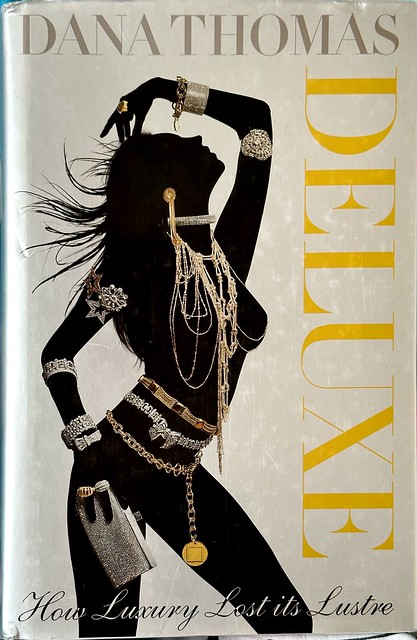5 minutes estimated reading time
I had this copy of Deluxe on my shelf for a while and finally managed got round to reading it. Deluxe – how luxury lost its lustre was written by Dana Thomas. Dana knows the subject that she’s talking about.
Dana Thomas
Dana Thomas is a Paris-based journalist who covered the fashion industry. Thomas started her journalistic career writing for the ‘style’ section of The Washington Post. For a decade and a half Thomas was a cultural and fashion correspondent for Newsweek in Paris. She has contributed to The New York Times, The New Yorker, The Wall Street Journal, the Financial Times, Vogue, Harper’s Bazaar and Architectural Digest. Deluxe is one of three books that she has written, the other is Fashionopolis, which focuses on the fast fashion industry and Gods and Kings covered the career of fashion designers Alexander McQueen and John Galliano.
Deluxe – How Luxury Lost its Lustre
In the introduction starts with a scatter gun approach. She bemoans Gucci and Burberry factory seconds on sale in China, revealing the global supply chain used by luxury brands now. She also criticises that luxury goods are used as currency by some sex workers from compensated dating to ‘returning gifts’ and pocketing the difference minus a restocking fee.
I get the sense that Thomas would like to see these companies remain small ‘secrets’ only known by a cosmopolitan cognoscenti, obviously including herself. What my younger peers would call ‘gatekeeping’ in a derogatory way.
Parasite singles
Most of Thomas’ ire focuses on Louis Vuitton early on. She describes Bernard Arnaud in unflattering terms and makes the globalisation of the brand sound like a mix of a happy accident and opportunity. Along the way she critiques the weakness of Japanese society’s love for luxury goods down to subtle social signalling and ‘parasite singles’ – young women living at home with their parents who spend their disposable income on luxury goods.
(The reality is that could be young people with a job in Spain or Italy either as east Asians and Southern Europeans tend to only move out of home to marry or to follow work or education.)
Japanese tourists took their luxury shopping abroad, taking advantage of duty-free shopping. It’s no coincidence that LVMH owns DFS (Duty Free Shopping) outlets across America and the Pacific rim. Some of the lessons that DFS and LVMH learned selling to Japanese luxury buyers, such last late closing, you can still see in showrooms across the Asia Pacific region.
Jumping from Japanese duty free shoppers in Hawaii, Thomas moves on to the connection between a generation of Italian designers and Hollywood. Richard Gere’s star power was as much down to his styling making him look the part by Giorgio Armani as it was to his considerable acting prowess.
From Hollywood, the book delves into the perfume operations of the design houses. It highlights how perfume formulation moved from being an in-house activity for design houses to being outsourced to a few specialists companies who work with a ‘creative brief’.
Quality issues
The area where I can agree most with Thomas is around the decline in quality of luxury goods. Deluxe approaches this from the different tactics that luxury companies have used to conceal their use of Chinese factories. However as Apple has shown, made in China doesn’t necessarily mean cheap or poorly made. Indeed, a decade and a half after Deluxe was written, we’re seeing local luxury brands displacing international luxury brands in the Chinese market for several reasons, usually explained using the term ‘guo chao‘.
Thomas estimates that there at least four factories in China who manufacture most of the luxury industry’s handbags and leather goods – alongside private label brands for department stores and supermarkets. I was surprised that even back in 2004, manufacturing in China only saved 30 percent of the bill of materials.
The book goes on to cover the cost cutting that has gone into luxury products, from clothes with cheap stitching, skipped tailoring such as no lining in jackets and dresses. Thomas highlights that these changes happened to allow luxury to go mass market. Luxury then followed customers out of the office or the salon into all aspects of their life including sportswear and ‘streetwear’. What my friend Jeremy calls the ‘Supremification’ of luxury.
The reliance on the mass market bought about two challenges in Thomas’ eyes:
- Counterfeit products that are almost indistinguishable from the real thing by experts
- Rockier finances for the large luxury corporates who are no longer sheltered from economic cycles by the continued spending of ultra high net worth individuals.
The future
Thomas left us with two parts to what we saw the future of luxury looking like:
- The continued pursuit of emerging markets with India replacing China due to demographics.
- The new luxury of industry specialists spinning off and creating new houses, because they were jaded with the existing business practices and structures. The book highlights Tom Ford; who recently gave up his label and sold it on in November 2022 to cosmetics business Estée Lauder and fellow fashion house Ermenegildo Zegna.
In summary
Dana Thomas’ Deluxe is a book of its time in the early to mid 2000s. Thomas clearly has some bias’ due to history with some of the protagonists, which is worthwhile bearing in mind. The historical part of the book is useful; but the luxury industry has moved on and in some ways the problems are now much worse. With those provisos in mind, I can recommend the book as a background read on the luxury sector.
